世纪大学实用英语综合教程第二册讲解材料
21世纪大学实用英语综合教程(第二册第1-4单元)-PPT文档
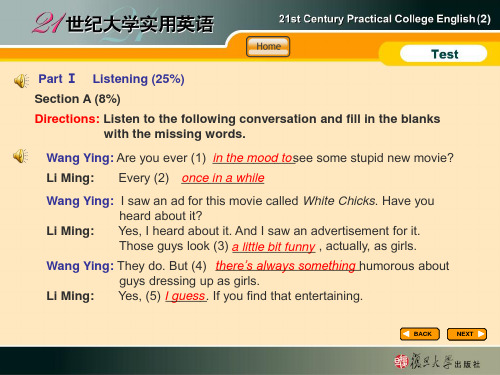
Wang Ying: I saw an ad for this movie called White Chicks. Have you heard about it?
Li Ming: Yes, I heard about it. And I saw an advertisement for it. Those guys look (3) a__li_tt_le__b_it_fu_n_n_y_ , actually, as girls.
As he was (10) _g_ro_w_i_n_g_u_p_ , Lenny taught himself how to play a number of musical instruments and sang in the famous California Boys Choir. He attended Beverley Hills High School but was not (11)a_n__e_x_c_e_ll_e_n_t _st_u_d_e_n_t . When he first heard the music of Prince he decided to drop the choir and (12)c_o_n_c_e_n_t_ra_t_e_o_n_ rock and roll. While still in high school, Lenny chose Romeo Blue as his (13) s_t_a_g_e_n_a_m__e and started performing locally. After graduating he was keen to (14) _fo_l_lo_w__a_c_a_r_e_e_r in music. Later Lenny dropped the name Romeo Blue and started performing (15) u_n_d_e_r_h_i_s_o_w__n_n_a_m__e . In 1989 Lenny released his first album, Let Love Rule, which was successful.
世纪大学实用英语综合教程第二册讲解材料

Understanding the Text
In the text, Mark Twain tells how he was given nice treatment because he was mistaken for someone else.
Reading Analysis
Topic
Part 1 (Para.1)
约翰考试是及格了,可是对这门学科掌握得并不好。
• asked him if I couldn’t …= I asked him if I could…
• The negation is used to indicate that the speaker is more polite and feels less likely to get what he asks. 否定的用法表示说话者的态度更客气,估计 自己的要求不太可能得到满足。
Though thinking himself to be well known, Mark Twain failed to get the train tickets he needed.
Details
Mark Twain asked for two train tickets three times and was answered with a sharp “No!” each time. Even the mention of his name did not work. Mark Twain felt ashamed as his company saw that his name was not so respected as he thought.
Language Points
Mark Twain /
21世纪大学实用英语综合教程第二册Unit7

21世纪⼤学实⽤英语综合教程第⼆册Unit7教案授课单元21世纪⼤学实⽤英语第2册第7单元本(章)节授课⽅式课堂讲授(√)实践课()教学时数 6授课要点本(章)节教学⽬标1.master the basic language and skills necessary to fulfillobligations;2.understand the main ideas of Text A, Text B and Text C,and master the useful sentence structures and words andexpressions found in the exercises relevant to the first twotexts;3.know how to use the subjunctive mood;4.know how to write a personal letter;5.understand paragraph development .教学重点和难点1.background information: Jean de La Fontaine and Fairy;2.the Practice of Fulfilling Obligations;3.identify the main idea of each paragraph;4.analyzes some difficult sentences and some language points;5. grammar: subjunctive mood思考题或作业1.vocabulary2.structure3.translation教学内容与组织安排1st period Text A (Global Reading)2nd period Text A (Detailed Reading)3rd period Grammar Review4 th period Practical Writing5th period Text B6th period Improve Your Reading Skills1st period Text A (Global Reading)Tell your classmates what you would do in the following situations and then read Text A to find what answers the author gives.2nd period Text A (Detailed Reading)Questions for understanding of deatails1) What does the author think Mary should do?Mary should say what she thinks directly to Harry.2) Why should people be honest according to the author?Because honesty makes things simple. / Because honesty is the easiest solution.3) Instead of being honest when they make mistakes what do people do?People try to create stories and excuses.4) What will happen to you if you are honest with people?You will benefit in the end.5) What is strange about the author’s friend who came to see him recently?He wouldn’t tell the author he wanted work though he couldn’t even pay his rent.6)It is really not that complicated… Why complicate life?By asking for it.7) How do you show respect both to others and to yourself?Be honest with others.Sentence Analysis其实这事并不那么复杂……为什么要把⽣活复杂化呢?句中complicated是形容词,complicate是动词。
21世纪大学实用英语综合教程-第二册-Unit-2
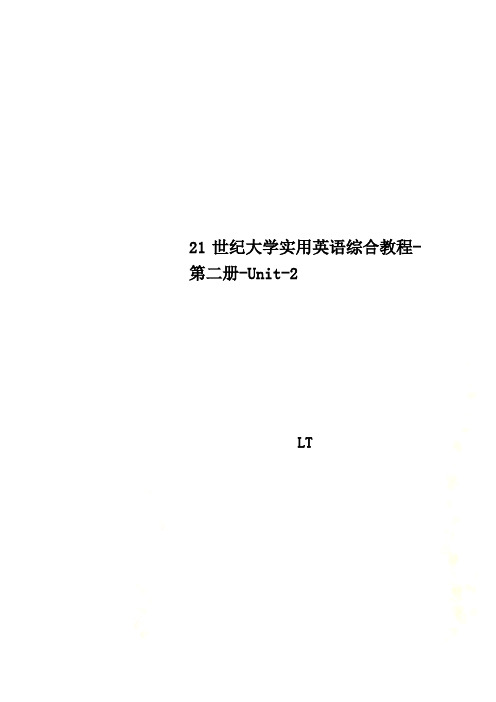
21世纪大学实用英语综合教程-第二册-Unit-2LT教案授课单元21世纪大学实用英语第二册第二单元本(章)节授课方式课堂讲授(√)实践课()教学时数 6授课要点本(章)节教学目标1. master the basic language and skills necessary to makeand respond to an apology;2. understand the main ideas of Text A, Text B and Text C;3. master the useful sentence structures and words andexpressions found in the exercises relevant to the firsttwo texts;教学重点和难点1. know how to use the structure of V + V-ing or + infinitive;2. know how to reply to an invitation;3. guess the meaning of unknown words in context.思考题或作业1. Have you ever been mistaken for someone else? Or do you know someone who has been mistaken for another person? Please share your story with your classmates.2. Now imagine you have the same name as the mayor of your city and look like him too. What might happen when you go to a hotel asking for a room and are told that the rooms are all booked?教学内容与组织安排1st period Listening and speaking2ndText Aperiod3rdText Bperiod4 thGrammar Reviewperiod5thPractical Writingperiod6thImprove Your Reading SkillsperiodTeaching procedures:First PeriodContent:Unit 2 listening and speakingStep 1 Lead-inIn the Listening and Speaking section, you will learn the basic language and skills necessary to make and respond to an apology;Step 2 Listening and Speaking1) The Language for Making and Responding to an ApologyA. have a warm-up activity by asking Ss what they say when they cause trouble to others or make mistakes;B. have the Ss listen to Exercise 1 (1-3 times) and fill in the blanks with the missing words;C. ask one S to read aloud the talk so Ss can check their completed answers;D. ask other Ss to form responses to the apologies in Exercise 2. trying to use the expression learned in Exercise 1.2) Making and Responding to an ApologyA.go through the new words in the 1st dialogue in Exercise 3;B. listen to the dialogue twice while filling in the missing words;C.ask Ss to answer the questions about the conversation by way of group discussion or the traditional teacher- student interaction;D.have them look for the language used to make and respond to an apology;E. Ss can role-play the dialogue;F. do the same with the second dialogueStep 3 Ask Ss to study the structures presented in Exercise 4, and create situations for dialogues in which Ss blame someone for his/her mistake or fault and expect them to make both apologies and excuses with the help of the language they have picked up in Exercise 1 and expressions from Exercise 4.Step 4 Listening PracticeA. Listen to the following people speaking and decide what they are talking about. (Each one will be given twice.)B Listen to the following five short dialogues and choose the appropriate answers.(Each one will be given twice.)C. Listen to the following short story twice. Listen carefully and decide whether the statements are true (T) or false (F) according to the story you have heard.D.Listen to the following talk and fill in the blanks with the missing words. (The talk is given twice.)E. Listen to the talk again and then answer the following questions orally.Answers to the listening practice5. C A D A B6. C A B D C7. T T F F T8. in a loud voice particularly interesting in the same room in curing them left alone a talk suffering from a delusion who are youStep 6 SummaryThere’re many ways of making an apology:—Excuse me for my interrupting you.—I’m really sorry for being late.—I’m terribly sorry to step on you.—I’ m awfully sor ry (that) I have forgetten your name.— I apologize for what I have said.—I’m afraid I seem to have forgetten your birthday.— I owe you an apology for the delay.—I’m sorry. I didn’t mean to hurt your felling.— It was really quite unintentional.— I hope you excuse me.There are also many ways of responding to an apology:—That’s (quite) all right.—These things happen; it can’t be helped.—I quite understand. Please don’t worry.— (Oh well.) Not to worry.—No problem. Let’s forget it.Step 7 Homework assignment1. Form a dialogue with your classmates.2. preview the new lesson.Second PeriodContent:Unit 2 Text AStep1 Lead-in1. Have you ever been mistaken for someone else? Or do you know someone who has been mistaken for another person? Please share your story with your classmates.2. Now imagine you have the same name as the mayor of your city and look like him too. What might happen when you go to a hotel asking for a room and are told that the rooms are all booked?Step 2 Ask Ss to read the following passage and see what happened toMark Twain when he tried to get a train ticket.Step 3 Introduce the Background InformationMark Twain (1835-1910)Mark Twain was the pen name of Samuel Langhorne Clemens, one of the major authors of American fiction. Twain is also considered the greatest humorist in American literature. Twain’s varied works include novels, travel narratives, short stories, sketches, and essays. His writings about the Mississippi River, such as The Adventures of Tom Sawyer, Life on the Mississippi, and Adventures of Huckleberry Finn, have been especially popular among modern readers. (From the 1998 World Book Encyclopedia)7-Eleven7-Eleven, Inc. is the world’s largest operator, franchiser and licensor of convenience stores with more than 24,000 units worldwide. Founded in Dallas, Texas in 1927 as an ice company, 7-Eleven pioneered the convenience store concept during its early years when its ice docks began selling milk, bread and eggs as a convenience to customers.The name 7-Eleven originated in 1946 when the stores were open from 7 a.m. until 11 p.m. Today, offering customers 24hour convenience, seven days a week is the cornerstone of 7-Eleven’s business. Approximately 5,800 7-Eleven and other convenience stores are operated and franchised in the United States and Canada.Step 4 Listen to the whole text and answer some questions about the text.Step 5 Deal with some languages points1) I was to take the sleeper train there: I planned to take the sleeper train there.我计划在那儿搭乘卧车。
世纪大学实用英语综合教程第二册unit listeningand speaking

• Tom Chang:Oh., it's an innocent social fib or excuse.
• Wang Ying:Oh, I’ve_g__o_t _it__ now! • Tom Chang:Sometimes we have to do it in our daily lives,
• To this the gentleman replied, “Oh, I haven’t told my family yet. I just sit around and l_is_t_en__to__co_n_v_e_r_s_at_io_n_s. I’ve changed my will _th_r_e_e_ti_m_e_s_ !”
• You can develop the skill by reading and familiarizing yourselves with the language for asking for and giving clarification:
• Asking for and giving clarificaent back in a month to the
doctor and the doctor said,“ Your hearing
_is_p_e_r_fe_c_t__ . Your family must be really pleased
that you can__h_ea_r_a_g_a_in___.
•3
• 1)Wang Ying: Are you going to the party tonight, Tom? They told me it was going to __b_e__fu_n___.
21世纪大学实用英语综合教程全新版第2册教学设计

21世纪大学实用英语综合教程全新版第2册教学设计一、教学目标•通过本教材的学习,使学生能熟练运用英语进行日常交流和沟通•通过课程安排,提高学生的听、说、读、写等语言综合技能•培养学生的语言应用能力和交际能力,让学生具有较强的能力应对生活和工作中的实际情境二、教学内容本教材共分为五个单元,每个单元包含听、说、读、写四个方面的教学内容。
教材主要内容如下:第一单元:Society1.Talking Points2.Listening Comprehension3.Reading Comprehension4.Writing第二单元:Relationships1.Talking Points2.Listening Comprehension3.Reading Comprehension4.Writing第三单元:Education1.Talking Points2.Listening Comprehension3.Reading Comprehension4.Writing第四单元:Technology1.Talking Points2.Listening Comprehension3.Reading Comprehension4.Writing第五单元:Globalization1.Talking Points2.Listening Comprehension3.Reading Comprehension4.Writing三、教学方法1.任务型教学法。
学生需要完成一定的任务,从而真正理解并掌握所学内容。
2.情境教学法。
根据实际情境模拟日常场景,让学生在真实环境中学习和交流。
3.合作学习法。
让学生在小组内协作完成任务,培养他们的团队合作精神和交流能力。
4.多媒体教学法。
借助多媒体技术,提高学生的学习兴趣和参与度。
四、教学重难点重点•学生的听、说、读、写的综合技能的培养•学生的语言应用能力和交际能力的提高•学生对国际化背景下的社会问题和主题进行思考难点•学生在一个新环境下使用英语进行交流时的自信心和技巧•学生对一些文化和思维方式的理解和适应五、教学评价1.日常评价。
21世纪大学实用英语综合教程(第二册)
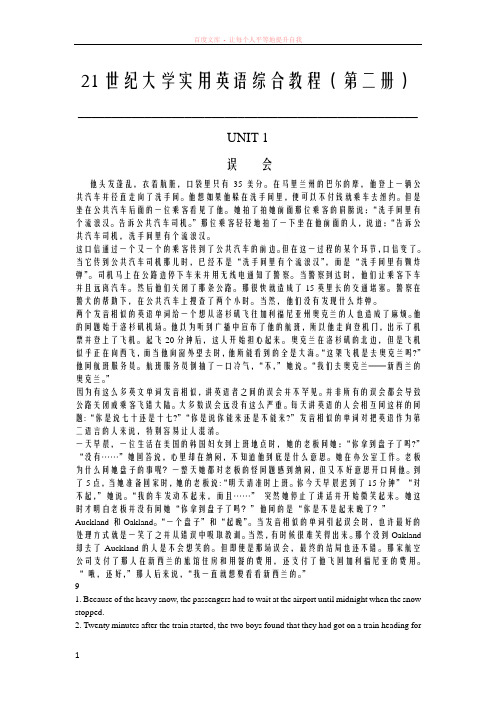
21世纪大学实用英语综合教程(第二册)___________________________________________________UNIT 1误会他头发蓬乱,衣着肮脏,口袋里只有35美分。
在马里兰州的巴尔的摩,他登上一辆公共汽车并径直走向了洗手间。
他想如果他躲在洗手间里,便可以不付钱就乘车去纽约。
但是坐在公共汽车后面的一位乘客看见了他。
她拍了拍她前面那位乘客的肩膀说:“洗手间里有个流浪汉。
告诉公共汽车司机。
”那位乘客轻轻地拍了一下坐在他前面的人,说道:“告诉公共汽车司机,洗手间里有个流浪汉。
这口信通过一个又一个的乘客传到了公共汽车的前边。
但在这一过程的某个环节,口信变了。
当它传到公共汽车司机那儿时,已经不是“洗手间里有个流浪汉”,而是“洗手间里有颗炸弹”。
司机马上在公路边停下车来并用无线电通知了警察。
当警察到达时,他们让乘客下车并且远离汽车。
然后他们关闭了那条公路。
那很快就造成了15英里长的交通堵塞。
警察在警犬的帮助下,在公共汽车上搜查了两个小时。
当然,他们没有发现什么炸弹。
两个发音相似的英语单词给一个想从洛杉矶飞往加利福尼亚州奥克兰的人也造成了麻烦。
他的问题始于洛杉矶机场。
他以为听到广播中宣布了他的航班,所以他走向登机门,出示了机票并登上了飞机。
起飞20分钟后,这人开始担心起来。
奥克兰在洛杉矶的北边,但是飞机似乎正在向西飞,而当他向窗外望去时,他所能看到的全是大海。
“这架飞机是去奥克兰吗?”他问航班服务员。
航班服务员倒抽了一口冷气,“不,”她说。
“我们去奥克兰——新西兰的奥克兰。
”因为有这么多英文单词发音相似,讲英语者之间的误会并不罕见。
并非所有的误会都会导致公路关闭或乘客飞错大陆。
大多数误会远没有这么严重。
每天讲英语的人会相互问这样的问题:“你是说七十还是十七?”“你是说你能来还是不能来?”发音相似的单词对把英语作为第二语言的人来说,特别容易让人混淆。
一天早晨,一位生活在美国的韩国妇女到上班地点时,她的老板问她:“你拿到盘子了吗?”“没有……”她回答说,心里却在纳闷,不知道他到底是什么意思。
世纪大学实用英语综合教程第二册第58单元ppt课件

In the States we start conversations with people in the street, in the subway; we’re a lot more (9)_e_n_t_h_u_si_a_s_ti_c than people here. You know, when I first came to England, I couldn’t understand why I was getting so little reaction from people. Now I see that they thought I was trying to be too friendly (10) _to_o__s_o_o_n . Here, once you have made a friend, it’s a friend (11) _fo_r_l_ife_, even if it takes a very long time. An Englishman in America on the other hand is immediately (12) r_e_s_p_e_c_te_d_ . Everyone wants to talk to him. We love his accent and his country. An American in England though, is (13) t_h_o_u_g_h_t_to__b_e_ a little inferior because of his behaviour and his language. One thing I’ve learned — I couldn’t understand why when I was talking to someone he would move away, you know, move backwards, and I thought “Do I smell? Am I (14) b_o_r_in_g_ him?” The reason was Americans (15) s_t_a_n_d_c_l_o_s_e_r when they’re talking. Again, English people like a certain distance.
21世纪大学实用英语综合教程 第二册 Unit 1讲解
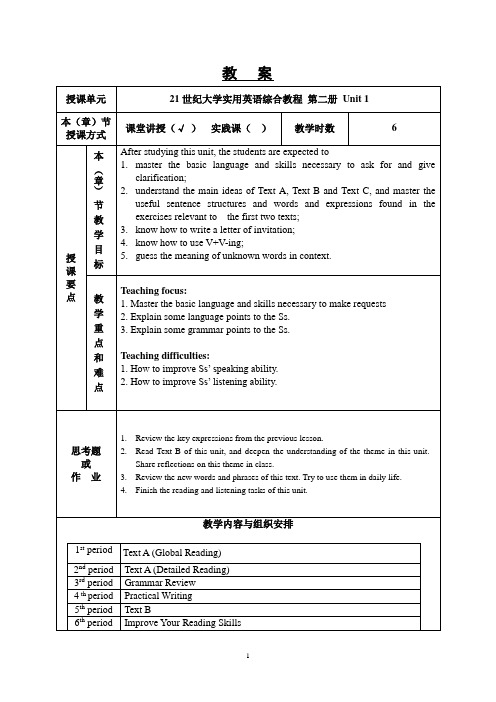
教案1st period Text A (Global Reading)1 Background InformationEnglish LanguageThe English language is the most widely spoken language in the world. It is used as either a primary or secondary language in many countries.During the 1500s, fewer than 2 million people spoke English. All of them lived in what is now Great Britain. Through the centuries, as the result of various historical events, English spread throughout the world. Today, about 400 million people speak English as their native language. Most of them live in Australia, Canada, Great Britain, Ireland, New Zealand, South Africa, and the United States.Another 100 million people living chiefly in Bangladesh, India, Pakistan, and in many African countries speak English in addition to their own language. An additional 200 million people probably know at least some English. (From the 1998 World Book Multimedia Encyclopedia)Characteristics of EnglishV ocabulary. English has a larger vocabulary than any other language. There are more than 600,000 words in the largest dictionaries of the English language.Some English words have been passed on from generation to generation as far back as scholars can trace. These words, such as woman, man, sun, hand, love, go, and eat, express basic ideas and feelings. Later, many words were borrowed from other languages, including Arabic, French, German, Greek, Italian, Latin, Russian, and Spanish. For example, algebra is from Arabic, fashion from French, piano from Italian, and canyon from Spanish.A number of words, such as doghouse and splashdown, were formed by combining other words. New words were also created by blending words. For example, motor and hotel were blended into motel. Words can be shortened to form new words, as was done with history to form story. Words called acronyms are formed by using the first letter or letters of several words. The word radar is an acronym for radio detection and ranging.Pronunciation and spelling in English sometimes seem illogical or inconsistent. Many words are spelled similarly though pronounced differently. Examples include cough, though, and through. Other words, such as blue, crew, to, too, and shoe, have similar pronunciations but are spelled differently. Many of these variations show changes that occurred during the development of English. The spelling of some words remained the same through the centuries, though their pronunciation changed.Grammar is the set of principles used to create sentences. These principles define the elements used to assemble sentences and the relationships between the elements. The elements include parts of speech and inflections.Parts of speech are the word categories of the English language. Scholars do not all agree on how to describe the parts of speech. The traditional description listseight classes: nouns, pronouns, verbs, adjectives, adverbs, prepositions, conjunctions, and interjections. The most important relationships of the parts of speech include subject and verb, verb and predicate, and modifier and the word modified.English has fewer inflections than most other European languages. An English noun has only two inflections, the plural and the possessive. Inflections are used to change the tense and number of a verb or the case of a pronoun. Inflections can change adjectives to the comparative or the superlative — for example, big, bigger, biggest.American EnglishAmerican English is a variety of the English language spoken in the United States. Although all Americans do not speak the same way, their speech has enough in common that American English can be recognized as a variety of English distinct from British English, Australian English, and other national varieties. American English has grown up with the country. It began to diverge from British English during its colonial beginnings and acquired regional differences and ethnic flavor during the settlement of the continent.Today it influences other languages and other varieties of English because it is the medium by which the attractions of American culture — its literature, motion pictures, and television programs — are transmitted to the world.Characteristics of American EnglishA. PronunciationIn broad terms, Canadian and American speakers tend to sound like one another. They also tend to sound different from a large group of English speakers who sound more British, such as those in Australia, New Zealand, and South Africa. For example, most Canadians and Americans pronounce an r sound after the vowel in words like barn, car,and farther, while speakers from the British English group do not. Also, some British English speakers drop h sounds at the beginning of words, so that he and his are pronounced as if they were spelled ee and is. The English spoken in Australia, New Zealand, and South Africa sounds more like British English than American English does because these varieties have had less time to diverge from British English. The process of separate development began later in these countries than in North America.In some cases there are differences between American English and British English in the rhythm of words. British speakers seem to leave out a syllable in words like secretary, as if it were spelled secretry, while Americans keep all the syllables. The opposite is true of other words, such as specialty, which Americans pronounce with three syllables (spe-cial-ty) while British speakers pronounce it with five syllables (spe-ci-al-i-ty). V owels and consonants may also have different pronunciations. British speakers pronounce zebra to rhyme with Debra, while American speakers make zebra rhyme with Libra. Canadian and British speakers pronounce the word schedule as if it began with an sh sound, while Americans pronounce it as if it began with an sk sound.B. WordsThe most frequently used words are shared by speakers of different varieties of English. These words include the most common nouns, the most common verbs, and most function words (such as pronouns, articles, and prepositions). The different varieties of English do, however, use different words for many words that are slightly less common —for example, British crisps for American potato chips, Australian billabong for American pond, and Canadian chesterfield for American sofa. It is even more common for the same word to exist with different meanings in different varieties of English.Corn is a general term in Britain, for which Americans use grain, while corn in American English is a specific kind of grain. The word pond in British English usually refers to an artificial body of water, whereas ponds also occur naturally in North America. British English chemist is the same as American English drugstore, and in Canada people go to the druggist. Many of the words most easily recognized as American in origin are associated with aspects of American popular culture, such as gangster or cowboy.C. SpellingAmerican English spelling differs from British English spelling largely because of one man, American lexicographer Noah Webster. In addition to his well-known An American Dictionary of the English Language (1828), Webster published The American Spelling Book (1783, with many subsequent editions), which became one of the most widely used schoolbooks in American history. Webster’s books sought to standardize spelling in the United States by promoting the use of an American language that intentionally differed from British English. The development of a specifically American variety of Englis h mirrored the newcountry’s separate political development. Webster’s most successful changes were spellings with or instead of our (honor, labor for the British honour, labour); with er instead of re (center, theater for the British centre, theatre); with an s instead of a c (defense, license for the British defence, licence); with a final ck instead of que (check, mask for the British cheque, masque); and without a final k (traffic, public, now also used in British English, for the older traffick, publick). Later spelling reform created a few other differences, such as program for British programme. Canadian spelling varies between the British and American forms, more British in eastern Canada and more American in western Canada.2. Group DiscussionHave you ever had an experience in which you are misunderstood or have failed to understand others? Misunderstandings can result from the spoken form or written form of the language that you use.2nd period Text A (Detailed Reading)Words and Expressions & Difficult Sentences1) misunderstanding: n. (an example of) wrong understanding 误解,误会e.g. Her poor French often leads to misunderstandings when she visits France. misunderstand: vt. understand wrongly 误解e.g. I’m sorry, I misunderstood you.It seems that you have misunderstood what I said at the meeting.2) get on: board (a bus, a train, etc.)登上(公共汽车、火车等)e.g. When I got on the bus, I found all the seats were occupied.They felt worried when they realized that they had got on the wrong train.3) head for: go towards 向…走去;朝…行进e.g. The ship was heading for Britain.He headed for the bus stop.4) …he could ride to New York without paying.介词without 解释为“不、未”,其后跟动词时,须用V-ing形式。
21世纪大学实用英语综合教程第二册第3单元
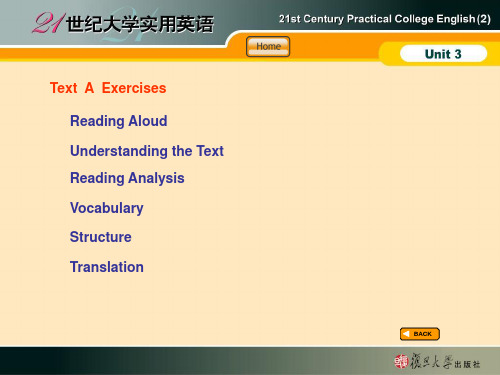
PREV.
BACK
Reading Analysis
Read Text A again and complete the following table. Part Ⅰ Topic Paragraphs 1-2 Main Idea Although everyone had a different agenda for me, I __________ had my own . I set short-time goals and focused on them. When a goal was achieved, I _________ set another __________ realistic goal .
BACK NEXT
Topics for Discussion. 1. The text is an excerpt of Michael Jordan’s book I can’t Accept Not Trying. Discuss how the title of his book applies to his experience. 2. In the text the writer says that each time he set a goal, he visualized where he wanted to be, what kind of player he wanted to become. Do you think it was of some help to his success? Why? 3. The writer says that if you’ve done your best, then you will have had some accomplishments along the way. Do you agree with the writer? Use examples to illustrate your opinion.
21世纪大学实用英语综合教程 第二册 Unit 3
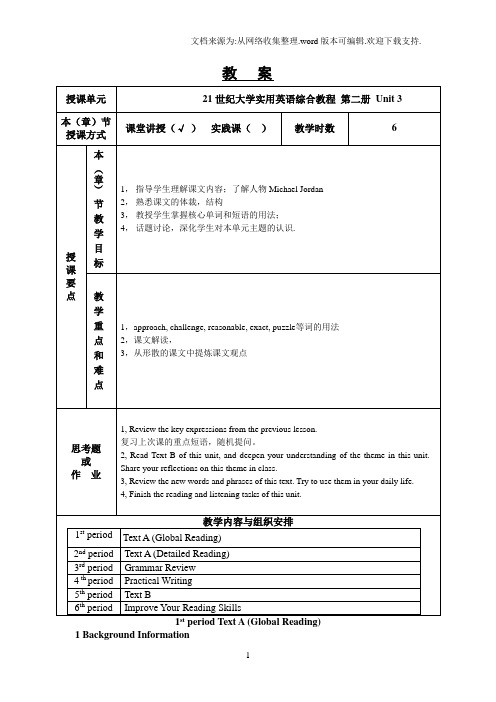
教案1 Background InformationMichael Jordan was born on February 17, 1963, in Brooklyn, New York, but his family decided to move to Wilmington, North Carolina when he was still a toddler. Jordan is the fourth of five children, including two older brothers and an older and younger sister. Michael’s dad worked hard at an electric plant while his mom labored full-time at a bank. Jordan’s parents worked hard to provide him and his siblings with a comfortable lifestyle.By the time Jordan was finishing his senior year at Laney, he had grown to 6’5” and attained a basketball scholarship from the University of North Carolina. Jordan’s ever-growing popularity began at UNC where he made a last minute game winning shot in the NCAA championship game.Michael’s talent and personality transcended the very lives of his fans. He single-handedly paved the way for off-the-court athlete endorsements —a billion dollar industry today!2, Group Discussion1) What’s Michael Jordan’s ultimate goal?2) How did he approach his goals?3) What did Jordan learn when he got cut from the varsity team in high school?4) How did Jordan achieve his goal of becoming a starter on the varsity?5) What did Jordan visualize each time?6) What did Jordan gain every time he reached his goal?7) What does the writer think of success?3, OverviewNothing seek, nothing find (无所求则无所获), as the saying goes. Set a goal, try to approach it, and there’s a good chance you’ll be successful. Talk to your classmates and tell them what your personal and professional goals are and how you achieved / will achieve them.If you try as hard as you can and don’t succeed, don’t get down on yourself. Actually you will have some accomplishments along the way. Besides, not everyone is going to be the greatest at something. But you still can be considered a success.4, Understanding the TextWhat did he visualize each time?What did he gain every time he reached his goal?What does the writer think of success?Why does he always set short-time goals?What’s the best way of accomplishing something?2nd period Text A (Detailed Reading)Ⅰ. Words and Expressionsprofessional a. of or belonging to a profession; earning money by playing a game, acting, etc.职业的;属于某专业的;职业性的approach 1. vt. move towards; come or go near(er) to; (begin to) deal with靠近;接近;(着手)处理;(开始)对付,对待2. n. act of approaching; way leading to sth.; path; road; way of dealing with a person or thing 接近;途径;入门; (处理问题的)方式,方法challenge n. invitation or call (to sb.) to take part in a game, contest, fight, etc. to prove who is better, stronger, more able, etc.; difficult, demanding or stimulating task挑战;邀请比赛;艰巨的任务She refused to take up the challenge that was offered.Bringing up a child is a tough challenge most people will face.step by step: proceeding steadily from one stage to the next; gradually 一步一步地;逐步地He is improving step by step.Step by step he learned the rules of the game.level n. relative position in rank, class or authority 水平,级别catch up with advanced world levels 赶上世界先进水平Students at this level tend to have a lot of problems with grammar.这一级别的学生往往会有许多语法问题。
21世纪大学实用英语综合教程 第二册 Unit 3

教案授课单元21世纪大学实用英语综合教程第二册Unit 3本(章)节授课方式课堂讲授(√)实践课()教学时数 6授课要点本(章)节教学目标1,指导学生理解课文内容;了解人物Michael Jordan2,熟悉课文的体裁,结构3,教授学生掌握核心单词和短语的用法;4,话题讨论,深化学生对本单元主题的认识.教学重点和难点1,approach, challenge, reasonable, exact, puzzle等词的用法2,课文解读,3,从形散的课文中提炼课文观点思考题或作业1, Review the key expressions from the previous lesson.复习上次课的重点短语,随机提问。
2, Read Text B of this unit, and deepen your understanding of the theme in this unit. -Share your reflections on this theme in class.3, Review the new words and phrases of this text. Try to use them in your daily life.4, Finish the reading and listening tasks of this unit.教学内容与组织安排1st period Text A (Global Reading)2nd period Text A (Detailed Reading)3rd period Grammar Review4 th period Practical Writing5th period Text B6th period Improve Your Reading Skills1st period Text A (Global Reading)1 Background InformationMichael Jordan was born on February 17, 1963, in Brooklyn, New York, but his family decided to move to Wilmington, North Carolina when he was still a toddler. Jordan is the fourth of five children, including two older brothers and an older and younger sister. Michael’s dad worked hard at an electric plant while his mom labored full-time at a bank. Jordan’s parents worked hard to provide him and his siblings with a comfortable lifestyle.By the time Jordan was finishing his senior year at Laney, he had grown to 6’5” and attained a basketball scholarship from the University of North Carolina. Jordan’s ever-growing popularity began at UNC where he made a last minute game winning shot in the NCAA championship game.Michael’s talent and personality transcended the very lives of his fans. He single-handedly paved the way for off-the-court athlete endorsements —a billion dollar industry today!2, Group Discussion1) What’s Michael Jordan’s ultimate goal?2) How did he approach his goals?3) What did Jordan learn when he got cut from the varsity team in high school?4) How did Jordan achieve his goal of becoming a starter on the varsity?5) What did Jordan visualize each time?6) What did Jordan gain every time he reached his goal?7) What does the writer think of success?3, OverviewNothing seek, nothing find (无所求则无所获), as the saying goes. Set a goal, try to approach it, and there’s a good chance you’ll be successful. Talk to your classmates and tell them what your personal and professional goals are and how you achieved / will achieve them.If you try as hard as you can and don’t succeed, don’t get down on yourself. Actually you will have some accomplishments along the way. Besides, not everyone is going to be the greatest at something. But you still can be considered a success.4, Understanding the TextWhat did he visualize each time?What did he gain every time he reached his goal?What does the writer think of success?Why does he always set short-time goals?What’s the best way of accomplishing something?2nd period Text A (Detailed Reading)Ⅰ. Words and Expressionsprofessional a. of or belonging to a profession; earning money by playing a game, acting, etc.职业的;属于某专业的;职业性的approach 1. vt. move towards; come or go near(er) to; (begin to) deal with靠近;接近;(着手)处理;(开始)对付,对待2. n. act of approaching; way leading to sth.; path; road; way of dealing with a person or thing 接近;途径;入门; (处理问题的)方式,方法challenge n. invitation or call (to sb.) to take part in a game, contest, fight, etc. to prove who is better, stronger, more able, etc.; difficult, demanding or stimulating task 挑战;邀请比赛;艰巨的任务She refused to take up the challenge that was offered.Bringing up a child is a tough challenge most people will face.step by step: proceeding steadily from one stage to the next; gradually 一步一步地;逐步地He is improving step by step.Step by step he learned the rules of the game.level n. relative position in rank, class or authority 水平,级别catch up with advanced world levels 赶上世界先进水平Students at this level tend to have a lot of problems with grammar.这一级别的学生往往会有许多语法问题。
世纪实用英语综合教程2教学U8B2ppt课件

with the missing words;
C. Ask them to answer the questions about
the conversation;
PREV.
NEXT
UNIT 8
Time Contents
Plan
D. Tell them to look for the language used to asking for and giving reasons;
BACK
UNIT 8
Ⅰ. Objectives After studying this unit, the students are expected to be able to 1. master the basic language and skills necessary to ask for
Listening and Speaking
Plan
The teacher begins with the Preview to make sure that the students have a general idea of what this unit is all about. After that, the teacher activates listening and Speaking exercises as follows:
1) The Language for Asking For and Giving Reasons A. Give a brief lead-in talk on the
nature and uses of asking for and giving reasons;
B. Present the necessary language by
21世纪大学实用英语综合教程 第二册 Unit 8
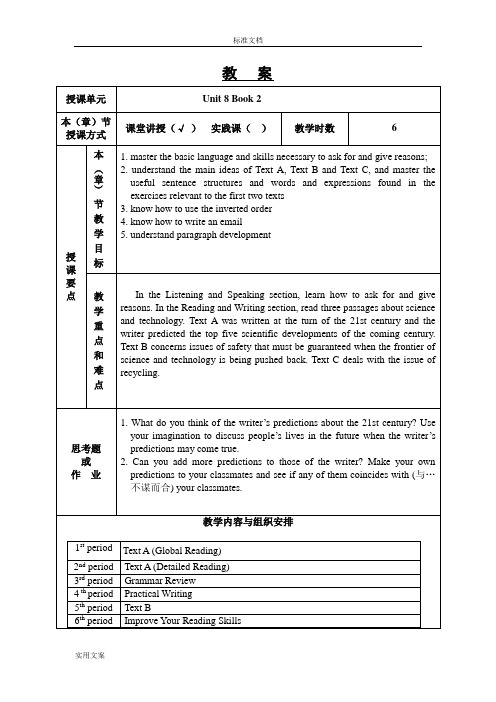
教案授课单元Unit 8 Book 2本(章)节授课方式课堂讲授(√)实践课()教学时数 6授课要点本(章)节教学目标1. master the basic language and skills necessary to ask for and give reasons;2. understand the main ideas of Text A, Text B and Text C, and master theuseful sentence structures and words and expressions found in theexercises relevant to the first two texts3. know how to use the inverted order4. know how to write an email5. understand paragraph development教学重点和难点In the Listening and Speaking section, learn how to ask for and give reasons. In the Reading and Writing section, read three passages about science and technology. Text A was written at the turn of the 21st century and the writer predicted the top five scientific developments of the coming century.Text B concerns issues of safety that must be guaranteed when the frontier of science and technology is being pushed back. Text C deals with the issue of recycling.思考题或作业1. What do you think of the writer’s predictions about the 21st century? Use your imagination to discuss people’s lives in the future when the writer’s predictions may come true.2. Can you add more predictions to those of the writer? Make your own predictions to your classmates and see if any of them coincides with (与…不谋而合) your classmates.教学内容与组织安排1st period Text A (Global Reading)2nd period Text A (Detailed Reading)3rd period Grammar Review4 th period Practical Writing5th period Text B6th period Improve Your Reading SkillsPart 1 Text A StudyBackground knowledge1) James TrefilAs an award-winning author and physicist, James Trefil has written more than 25 books on a range of science topics. He’s a contributor to National Public Radio and Smithsonian Magazine, and a physics professor at Virginia’s Geor ge Mason University, U.S.A.The 20th century produced scientific and technological change at a dizzying pace-greater than in any other century in history. But the 21st century, the dawn of the new millennium, may well see even more dramatic change driven by advances in science and technology.On these pages are my predictions for the top scientific developments we’ll see in the next 100 years, in the order I think they’ll happen.2) Modern Science (20th century)a. GeneticsAt the beginning of the 20th century, the life sciences entered a period of rapid progress. Mendel’s work in genetics was rediscovered in 1900, and by 1910 biologists had become convinced that genes are located in chromosomes, the threadlike structures that contain proteins and deoxyribonucleic acid (DNA). During the 1940s American biochemists discovered that DNA taken from one kind of bacterium could influence the characteristics of another. From these experiments, it became clear that DNA is the chemical After American biochemist James Watson and British biophysicist Francis Crick established the structure of DNA in 1953, geneticists became able to understand heredity in chemical terms. Since then, progress in this field has been astounding. Scientists have identified the complete genome, or genetic catalog, of the human body (see Human Genome Project). In many cases, scientists now know how individual genes become activated and what effects they have in the human body. Genes can now be transferred from one species to another, side-stepping the normal processes of heredity and creating hybrid organisms that are unknown in the natural world (see Transgenic Organism).b. MedicineAt the turn of the 20th century, Dutch physician Christiaan Eijkman showed that disease can be caused not only by microorganisms but by a dietary deficiency of certain substances now called vitamins. In 1909 German bacteriologist Paul Ehrlich introduced the world’s first bactericide, a chemical designed to kill specific kinds of bacteria without killing the patient’s cells as well. Following the discovery of penicillin in 1928 by British bacteriologist Sir Alexander Fleming, antibiotics joined medicine’s chemical armory, making the fight against bacterial infection almost a routine matter. Antibiotics cannot act against viruses, but vaccines have been used to great effect to prevent some of the deadliest viral diseases. Smallpox, once aworldwide killer, was completely eradicated by the late 1970s, and in the United States the number of polio cases dropped from 38,000 in the 1950s to less than 10 a year by the 21st century.By the middle of the 20th century scientists believed they were well on the way to treating, preventing, or eradicating many of the most deadly infectious diseases that had plagued humankind for centuries. But by the 1980s the medical community’s confidence in its ability to control infectious diseases had been shaken by the emergence of new types of disease-causing microorganisms. New cases of tuberculosis developed, caused by bacteria strains that were resistant to antibiotics. New, deadly infections for which there was no known cure also appeared, including the viruses that cause hemorrhagic fever and the human immunodeficiency virus (HIV), the cause of acquired immunodeficiency syndrome.In other fields of medicine, the diagnosis of disease has been revolutionized by the use of new imaging techniques, including magnetic resonance imaging and computed tomography. Scientists were also on the verge of success in curing some diseases using gene therapy, in which the insertion of normal or genetically altered genes into a patient’s cells replaces nonfunctional or missing genes.Improved drugs and new tools have made surgical operations that were once considered impossible now routine. For instance, drugs that suppress the immune system enable the transplant of organs or tissues with a reduced risk of rejection (see Medical Transplantation). Endoscopy permits the diagnosis and surgical treatment of a wide variety of ailments using minimally invasive surgery. Advances in high-speed fiber-optic connections permit surgery on a patient using robotic instruments controlled by surgeons at another location. Known as telemedicine, this form of medicine makes it possible for skilled physicians to treat patients in remote locations or places that lack medical help.c. Social SciencesIn the 20th century the social sciences emerged from relative obscurity to become prominent fields of research. Austrian physician Sigmund Freud founded the practice of psychoanalysis, creating a revolution in psychology that led him to be called the “Copernicus of the mind.”In 1948 the American biologist Alfred Kinsey published Sexual Behavior in the Human Male, which proved to be one of the best-selling scientific works of all time. Although criticized for his methodology and conclusions, Kinsey succeeded in making human sexuality an acceptable subject for scientific research. The 20th century also brought dramatic discoveries in the field of anthropology, with new fossil finds helping to piece together the story of human evolution. A completely new and surprising source of anthropological information became available from studies of the DNA in mitochondria, cell structures that provide energy to fuel the cell’s activities. Mitochondrial DNA has been used to track certain genetic diseases and to trace the ancestry of a variety of organisms, including humans.d. Three Mile IslandThree Mile Island is an island in theSusquehanna River in Dauphin County,Pennsylvania, near Harrisburg, of area 3.29km2 (814 acres). The name is most commonlyassociated with an accident at the Three MileIsland Nuclear Generating Station on March28, 1979, when reactor TMI-2 suffered apartial core meltdown.No identifiable injuries due to radiation occurred (although a government report by L. Battist et. al. stated that “the projected number of excess fatal cancers due to the accident …is approximately one.”) It was, however, a serious economic and public relations disaster. It also furthered a serious decline in the public popularity of nuclear power.e. The Chernobyl AccidentThere have been different reports about the consequences of the accident. Two different versions have been presented below.In 1986, an explosion and fire at the nuclear power plant in Chernobyl, near Kiev, released large amounts of radioactive material into the atmosphere. Nuclear fallout from the accident caused many health and environmental problems.Soviet officials claimed only 31 people died from the accident and about 200 were seriously injured. But in the early 1990’s, Ukrainian officials estimated that 6,000 to 8,000 people died as a result of the explosion and its aftermath. The disaster has caused high rates of cancer and other illnesses in Ukraine, Belarus, and Russia.Part 2. Text global reading1) Have you ever thought about how advances in science and technology may change our world in a hundred years? Can you predict what people will be able to do then? Now talk to your classmates, make a list of the possible breakthroughs you can think of and discuss the ways people may make use of them.2. Reading AnalysisPart One Introductory remarks about predictions for the 21st centuryPart Two 5 predictionsPart 3. Detailed learning1. top: most important; best 最重要的;最好的eg. Ours is one of the world’s top engineering companies.2. breakthrough n. important development or discovery, esp. in scientific knowledge(尤指科学知识上的)重大进展(或发现),突破eg. Scientists have made a major breakthrough in the treatment of cancer.eg. Breakthroughs in nuclear research have led to the development of nuclear bombs.3. technology n. (the study and knowledge of) the practical, esp. industrial, use of scientific discoveries 技术(学),工艺(学);工业技术eg. the Science and technology have caused major changes in the way we live.eg. Modern technology has opened our eyes to many things.4. millennium / /: n. period of 1,000 years 一千年,千年期eg. Ten decades are a century, and ten centuries are a millennium.eg. events which took place at the turn of the last millennium5. prediction: n. a statement about what is going to happen 预言,预测eg. His prediction is no better than a wild guess.eg. Many of his predictions are coming true.6. refine vt. remove impurities from (sth.), purify; improve (sth.) by removing defects and attending to detail 提炼,精炼;提纯;使变得完善eg. Oil must be refined before it can be used.eg. Engineers are working on developing and refining the car engines.eg. This theory still needs a little refining.7. extraordinary a. beyond what is ordinary; very unusual; remarkable 不平常的,不普通的;非常的;特别的;非凡的eg. He’s the most extraordinary man I’ve ever met.eg. The man’s story was so extraordinary that I didn’t know whether to believe him or not.8. die of: die because 因…而死;死于eg. She died of cancer two years ago.eg. The animals died of hunger in the snow.9. thanks to: because of, owing to 因为,由eg. Today, thanks to the Internet, you can do your Christmas shopping from home.eg. We had great success — thanks to a lot of hard work.eg. The baby is awake, thanks to your shouting10. damage :1). n. harm or destruction done to sb./sth. 损害;损坏;毁坏;破坏eg. The flood has caused a lot of damage.eg. Watching TV all the time may do damage to your eyes.2) vt. cause damage to 损害;损坏;毁坏eg. Smoking can severely damage your health.eg. The building has been severely damaged by fire.11. push sb. to do sth.: 催促某人做某事eg. My parents keep pushing me to get a good job.eg. They pushed him hard to take up science.12. effect n. result; influence 结果;效果;影响eg. To solve this problem, we must understand the relationship between cause and effect.eg. This drug can have a serious effect on one’s health.13. ecosystem /μEτσIσ7ϑEκ:ι5/: n. ecological unit consisting of a group of plants andliving creatures interacting with each other and with their surroundings 生态系统eg. All animals are important for maintaining a healthy ecosystem.14. complex /κ5Zσκελπμ/: a. difficult to understand or explain because there aremany different parts 复杂的eg. a complex system of highwayseg. This is a very complex issue.eg. We have got a lot of complex problems to solve.15. in operation: (of a machine, etc.) working; (of a plan, activity, organized process)being carried out; active (机器等)工作中;运转着;(计划、活动、有组织的程序)实施中;起作用,生效eg. The nuclear reactor has been in operation since 1985.eg. Over 20 programmers are in operation to educate the young people in this country.eg. Is this rule in operation yet?16. and so on: and more of the same kind 等等eg. If you were brought to a completely new country for a long-term stay,eg. How would you cope with the language, the weather, the people, and so on?eg. There was quite a lot to eat at the dinner party. We had meat, fish, vegetables and so on.17. come full circle: return to the starting point after a series of events, experiences, etc. 兜了个圈子回到原处eg. Sooner or later, fashion comes full circle.eg. The Smiths have come full circle from wealth to poverty to wealth again. Part 4. Grammar learning倒装(Inversion)谓语全部或部分放在主语之前的语法现象称为倒装。
21世纪大学实用英语综合教程(第二册)Unit 3

1 I always had the ultimate goal of being the best, but I approached everything step by step. That’s why I wasn’t afraid to go to the University of North Carolina after high school. 2 Everyone told me I shouldn’t go because I wouldn’t be able to play at that level. They said I should go to the Air Force Academy because then I would have a job when I finished college. Everyone had a ? different agenda for me. But I had my own.
每个人都对我说我不应该去北卡大学,因为我的篮球还没有打到那个水平。他们 说我应该去空军军官学校,因为那样的话,我毕业时就能得到一份工作。每个人都为 我制定了不同的计划,但我有我自己的计划。
BACK
Language Points
Michael Jordan /
/ 迈克尔·乔丹(1963— ,
goals. In his book he writes about how he approached the challenges he faced. As you read this excerpt, think about how his book’s title, I Can’t Accept Not Trying, applies to his experiences.
21世纪大学实用英语综合教程第二册第3单元

Now retell the main idea of the passage by using the information in the table you
have completed.
PBRAECVK.
BACK
Vocabulary
Fill in the blanks with the words given below. Change the forms where necessary.
4. She never tries anything new because she’s afraid of_fa_i_lu_r_e_.
5. He offered a c_h_a_l_le_n_g_e_ to anybody to come and beat him at chess.
BACK
NEXT
Paragraphs
Main Idea
Although everyone had a
1-2
different agenda for me, I
_h_a_d_m__y_o_w_n_ .
3-4
I set short-time goals and
focused on them. When a goal
was achieved, I _se_t_a_n_o_t_h_e_r
8. The bank has offered a reward (奖赏) for any information _le_a_d_in_g__to__ the arrest of the thieves.
PREV.
BACK
Structure
apply to
build up come through concentrate on
21世纪大学实用英语综合教程 第二册 Unit 5
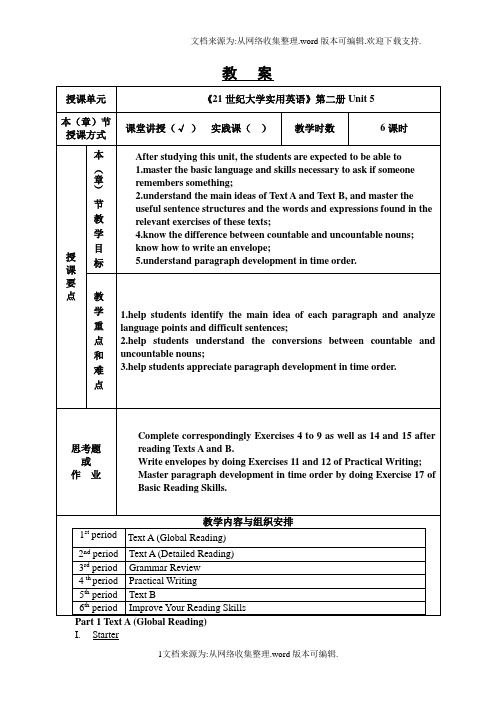
教案I.StarterHave you ever written or received a love note? Believe it or not, this oldest form of expressing love still works the best in the modern world. Suppose you are going to write a love note. What would you want to say to your lover? Discuss this with your classmates.After the discussion, Teacher asks several students to present their “love notes” to the class and read the two well-known love notes as follows:When You Are OldBY WILLIAM BUTLER YEATSWhen you are old and grey and full of sleep,And nodding by the fire, take down this book,And slowly read, and dream of the soft lookYour eyes had once, and of their shadows deep;How many loved your moments of glad grace,And loved your beauty with love false or true,But one man loved the pilgrim soul in you,And loved the sorrows of your changing face;And bending down beside the glowing bars,Murmur, a little sadly, how Love fledAnd paced upon the mountains overheadAnd hid his face amid a crowd of stars.朱生豪给妻子宋清如的情书中写道:“醒来觉得甚是爱你。
- 1、下载文档前请自行甄别文档内容的完整性,平台不提供额外的编辑、内容补充、找答案等附加服务。
- 2、"仅部分预览"的文档,不可在线预览部分如存在完整性等问题,可反馈申请退款(可完整预览的文档不适用该条件!)。
- 3、如文档侵犯您的权益,请联系客服反馈,我们会尽快为您处理(人工客服工作时间:9:00-18:30)。
Details
Mark Twain asked for two train tickets three times and was answered with a sharp “No!” each time. Even the mention of his name did not work. Mark Twain felt ashamed as his company saw that his name was not so respected as he thought.
21世纪大学实用英语
21 世纪大学实用英语
综 合 教 程(第二册)
Unit 2
Mistaken Identity
Text A Mistaken Identity
Starter Background Information
Text Understanding Language Points Exercises Writing
Reading Analysis
Part 4 (Para.9-12)
Mark Twain got to know why he Topic was given such nice treatment.
Details
From what the porter said, Mark Twain knew that he had been invited onto the train as the mayor of New York, not because he was Mark Twain, the famous writer.
Starter: Mistaken Identity
Have you ever been mistaken for someone else? Or do you know someone who has been mistaken for another person? Please share your story with your classmates.
suitable for a new use, situation, etc.; alter
or modify (a text) for television, etc.
• 使适应,使适合;改编,改写
• railway /
/: n. track with
rails for trains to run on 铁路;铁道
Reading Analysis
Part 2 (Para.2-5)
Topic
Mark Twain was invited by the conductor to get onto the train.
Details
A young porter whispered something to the conductor while nodding towards Mark Twain. At once the conductor came to Mark Twain and invited him to the big family compartment on the train.
7-Eleven
• 7-Eleven, Inc. is the world’s largest operator, franchiser and licensor of convenience stores with more than 24,000 units worldwide. Founded in Dallas, Texas in 1927 as an ice company, 7Eleven pioneered the convenience store concept during its early years when its ice docks began selling milk, bread and eggs as a convenience to customers. The name 7Eleven originated in 1946 when the stores were open from 7 a.m. until 11 p.m. Today, offering customers 24hour convenience, seven days a week is the cornerstone of 7-Eleven’s business.
Reading Analysis
Part 3 (Para.6-8) Mark Twain received good service Topic on theຫໍສະໝຸດ train.Details
The porter took their suitcases and settled them comfortably in the luxurious compartment. He smiled a lot and promised to get them anything they wanted.
Understanding the Text
In the text, Mark Twain tells how he was given nice treatment because he was mistaken for someone else.
Reading Analysis
Topic
Part 1 (Para.1)
Language Points
Mark Twain /
/ 马克·吐温
(1835—1910,美国作家,以语言幽默见
长,主要作品有长篇小说《哈克贝里·费恩历险记》
等)
identity /
n
sb./sth. is 身份
/: n. who or what
• adapt /
/: vt. make (sth.)
